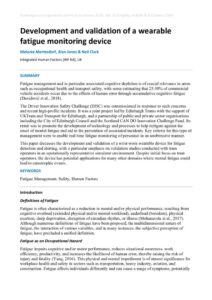| Document | Author Melanie Mertesdorf, Alan Jones & Neil Clark |
| Abstract Fatigue management and in particular associated cognitive depletion is of crucial relevance in areas such as occupational health and transport safety, with some estimating that 25-50% of commercial vehicle accidents occur due to the effects of human error through accumulative cognitive fatigue (Davidović et al., 2018). The Driver Innovation Safety Challenge (DISC) was commissioned in response to such concerns and recent high-profile incidents. It was a joint project led by Edinburgh Trams with the support of UKTram and Transport for Edinburgh, and a partnership of public and private sector organisations including the City of Edinburgh Council and the Scotland CAN DO Innovation Challenge Fund. Its remit was to promote the development of technology and processes to help mitigate against the onset of mental fatigue and aid in the prevention of associated incidents. Key criteria for this type of management were to enable real time fatigue monitoring of personnel in an unobtrusive manner. This paper discusses the development and validation of a wrist-worn wearable device for fatigue detection and alerting, with a particular emphasis on validation studies conducted with tram operators in an operationally representative simulator environment. Despite initial focus on tram operators, the device has potential applications for many other domains where mental fatigue could lead to catastrophic events. |

